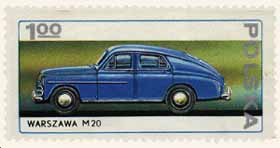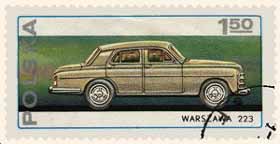Following World War II the motor industry of Poland lay in ruins. It was recognized that the rebuilding of the industry would be necessary and it was decided to start the process in Warsaw, where in 1948 began the construction of several buildings that would come to be known as FSO (Fabryka Samochodow Osobowych, which means Passenger Automobile Factory). FIAT was approached for assistance and a deal was signed for the production of Fiats under license, but the beginning of the Cold War put a stop to these plans. Instead, the Soviets persuaded FSO to purchase the rights for series production of the Russian Pobieda M20, a rather outdated design with roots going back to the Ford model A (which had been in production in Russia during the 1930s). The agreement was signed in 1950.
a parade of FSO cars in 1971
With the introductions of successive models, from the Pobieda-based Warszawa, the Syrena, the Polski Fiat 125p, to the Polonez, the FSO facilities expanded in to many other parts of Poland, including towns like Nysa, Elblag, and Opole.
Most of the FSO models were exported to quite a few different parts of the globe. At one point, in 1968, 25% of Warszawas were heading for countries such as China, Turkey, Mongolia, Finland, and Egypt, and some South American and East European nations. The Polonez has also been selling in some West European countries. And some of models were even assembled abroad at one time.


In the fall of 1995 the Polish government decided to privatize the company, creating FSO Motor Corporation. The South Korean auto-maker Daewoo purchased US$20 million worth of the shares, promising to invest another 1.121 billion within six years. Currently the resulting Daewoo-FSO joint venture company makes the Polonez and in addition, assembles the Korean Tico and Espero models, and also Citroen C-15 cargo vans. It looks like the days of the Polonez are numbered however, as it will probably be dropped. And so it seems that the FSO suffix will also be dropped from the company name.